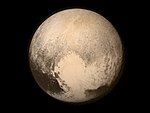K2-3c
| Discovery[1] | |
|---|---|
| Discovery site | Kepler Space Observatory |
| Discovery date | 2015 |
| Transit | |
| Orbital characteristics[2] | |
| 0.1357+0.0023 −0.0022 AU | |
| Eccentricity | 0.048+0.073 −0.035 |
| 24.646729+0.000044 −0.000042 d | |
| Inclination | 89.84°+0.11° −0.14° |
| −180°+100° −110° | |
| Semi-amplitude | 0.88±0.28 m/s |
| Star | K2-3 |
| Physical characteristics[2] | |
| 1.582+0.057 −0.051 R🜨 | |
| Mass | 2.68±0.85 M🜨 |
Mean density | 3.7±1.2 g/cm3 |
| Temperature | 371.8+3.8 −3.9 K (98.7 °C; 209.6 °F, equilibrium) |
K2-3c, also known as EPIC 201367065 c, is an exoplanet orbiting the red dwarf star K2-3 every 24 days. It is 143 light-years away.[3] It has a density of about 3.7 g/cm3, indicating that it could be an ocean world or a mini-Neptune. It is the second-smallest planet in the system by both radius and mass, with a mass almost three times that of Earth.[4]
References
- ^ Crossfield, Ian J. M.; et al. (2015). "A Nearby M Star with Three Transiting Super-Earths Discovered by K2". The Astrophysical Journal. 804 (1). 10. arXiv:1501.03798. Bibcode:2015ApJ...804...10C. doi:10.1088/0004-637X/804/1/10.
- ^ a b Diamond-Lowe, Hannah; Kreidberg, Laura; Harman, C. E.; Kempton, Eliza M.-R.; Rogers, Leslie A.; Joyce, Simon R. G.; Eastman, Jason D.; King, George W.; Kopparapu, Ravi; Youngblood, Allison; Kosiarek, Molly R.; Livingston, John H.; Hardegree-Ullman, Kevin K.; Crossfield, Ian J. M. (2022), "The K2-3 System Revisited: Testing Photoevaporation and Core-powered Mass Loss with Three Small Planets Spanning the Radius Valley", The Astronomical Journal, 164 (5): 172, arXiv:2207.12755, Bibcode:2022AJ....164..172D, doi:10.3847/1538-3881/ac7807, S2CID 251067119
- ^ Vallenari, A.; et al. (Gaia collaboration) (2023). "Gaia Data Release 3. Summary of the content and survey properties". Astronomy and Astrophysics. 674: A1. arXiv:2208.00211. Bibcode:2023A&A...674A...1G. doi:10.1051/0004-6361/202243940. S2CID 244398875. Gaia DR3 record for this source at VizieR.
- ^ "K2-3 PLANET HOST PAGE". NASA Exoplanet Archive. Retrieved 2015-10-17.



